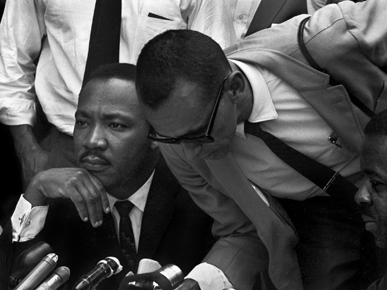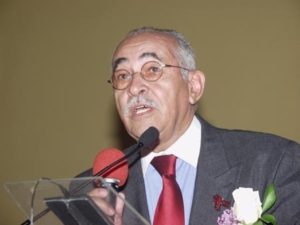
Few civil rights leaders in America were in the thick of things as much as Wyatt Tee Walker. He was chief of staff to Martin Luther King Jr.; the first, full-time executive director of the Southern Christian Leadership Conference; and the lead strategist behind the Birmingham campaign – the clash that seared Bull Connor, fire hoses and police dogs into America’s consciousness and spurred passage of the 1964 Civil Rights Act.
 But Rev. Walker’s difference-making didn’t end there. Decades later, he played a key role in the push for school choice, making him, like Rosa Parks and Martin Luther King III, another noteworthy bridge between the two movements.
But Rev. Walker’s difference-making didn’t end there. Decades later, he played a key role in the push for school choice, making him, like Rosa Parks and Martin Luther King III, another noteworthy bridge between the two movements.
“All of the experience I gained in the human rights struggle was applicable to this new frontier of human rights,” he writes in the forward to “A Light Shines in Harlem,” the 2014 book by journalist Mary C. Bounds that chronicles New York’s first charter school, which Walker helped to create. “In my most reflective moments, I believe this is where Dr. King would be if he were still alive! In the charter movement, I am continuing the work of Dr. King that has far-reaching meaning.”
The National Alliance for Public Charter Schools recently honored Walker with a lifetime achievement award and this moving video tribute. He was vital to passage of New York’s charter school law in 1999, then to creation of the Sisulu Children’s Academy in Harlem, named for South African freedom fighter Walter Sisulu. Now called Sisulu-Walker Charter School, it boldly blazed the trail for Empire State charter schools, including the 200-plus now in New York City alone.
Those contributions are worthy of recognition in their own right. But they also offer yet more evidence of the oft-hidden ties between school choice, the civil rights movement and progressive politics. I know, I know; I’m a broken record. But I’d like to respectfully ask, again, that folks on the left who dismiss choice, because they think it sprung from an enemy camp, to consider Walker and so many others whose visions of social justice include expansion of educational freedom.
Clearly, it’s not profiteering and privatization that drive them. It’s a desire to find high-quality options for children who need them the most. In the case of African American communities, that powerful impulse, to use any and all resources to create the best possible alternatives, goes back centuries, fueled by racist laws that denied educational opportunities, then by laws and practices that resulted in schools that were inferior, or didn’t work, or both.
Besides serving as Dr. King’s trusted aide, Walker had been a local NAACP president and a state director of the Congress of Racial Equality. In the late 1960’s, he moved to Harlem to become senior pastor of the influential Canaan Baptist Church. There, he continued to fight for better jobs, affordable housing and a long list of other issues that fellow progressives would find compelling. Eventually, he turned to his community’s educational challenges, and, in his view, the failure of traditional public schools to address them.
Walker rallied other inner-city ministers to support the bill that became New York’s charter school law. He offered space in his church to the Sisulu school. He welcomed private funding. Despite some ups and downs, the school ultimately succeeded, improving thousands of lives in the “capital of black America.”
A lot of people deserve credit for that success, including Steve Klinsky, the idealistic businessman who founded Victory Education Partners and was an unstoppable force behind Sisulu’s rise. (Klinsky, it’s worth noting, was a longtime partner in the private equity firm co-founded by Ted Forstmann, who co-founded the Children’s Scholarship Fund, which inspired creation of Florida’s tax credit scholarship program, which is administered by nonprofits like Step Up For Students, which hosts this blog. How’s that for six degrees of separation? 🙂 ) At the same time, there’s no doubt the diverse coalition behind the NY charter school effort followed the moral compass of the civil rights warrior in its midst.

Walker is hardly the only civil rights leader to say so. Here in Florida, the Rev. H.K. Matthews, a civil rights statesman who marched with Dr. King at Selma, has stressed it repeatedly. So have black ministers at odds with the Florida NAACP over a lawsuit it joined to kill the state’s tax credit scholarship program.
In January, before he rallied 10,000 people in support of those scholarships, Martin Luther King III said his father would have backed school choice too: “I would assume my father would support anything that lifted up and created opportunities for ‘the least of these.’ I don’t think he would get caught up in the politics of it.”
It’s baffling that contrary perceptions linger so strongly on the left, but it wouldn’t be the first time tribal smoke screens kept good people from seeing the evidence in front of them. Perhaps nobody knows that better than the courageous souls, like Rev. Walker, who wouldn’t back down to deep-rooted racism. Thank goodness they never stopped fighting.



Great piece Ron…thanks.